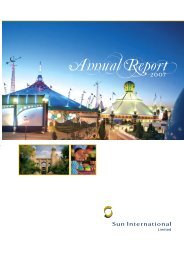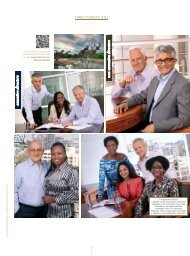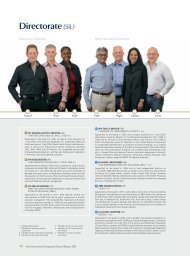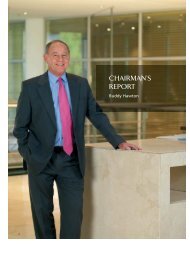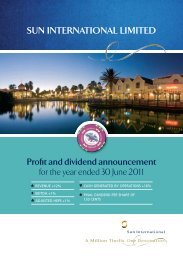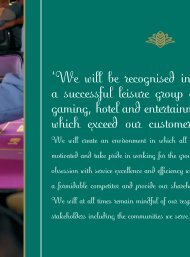PDF 25 MB - Sun International | Investor Centre
PDF 25 MB - Sun International | Investor Centre
PDF 25 MB - Sun International | Investor Centre
You also want an ePaper? Increase the reach of your titles
YUMPU automatically turns print PDFs into web optimized ePapers that Google loves.
SUN INTERNATIONAL ANNUAL REPORT ’10<br />
The automation of the Performance Management System (PMS) – ‘<strong>Sun</strong>Spec’<br />
– was completed and is now being rolled out across the group.<br />
Going forward, plans are still in place to introduce the LMS by June 2011.<br />
The delivery of Manager and Employee Self-service within the PeopleSoft<br />
application will commence during the latter part of the new financial year.<br />
The e-recruitment site on our corporate website for external and internal<br />
applicants continues to provide benefits to our talent acquisition strategy.<br />
UNION RELATIONSHIPS<br />
The group concluded a long term agreement with the SA Catering and<br />
Commercial Allied Workers Union (SACCAWU) in South Africa and<br />
one-year agreements in Botswana and Swaziland (with the respective<br />
recognised unions) in the year under review. The agreements improved<br />
wages and other terms and conditions of employment of employees.<br />
Negotiations are in progress in Zambia, Lesotho and Namibia.<br />
The current minimum TCOE remuneration for unionised employees<br />
compares favourably with other leading sectors in the economy.<br />
The group concluded two additional agreements with SACCAWU granting<br />
the union full recognition and bargaining rights at The Table Bay and Sibaya<br />
Entertainment Kingdom. Representatives from all unionised units (both<br />
management and full-time shop stewards) meet at a Central Forum on a<br />
quarterly basis to negotiate terms and conditions other than wages and<br />
employment benefits. Amongst others, parties are currently negotiating<br />
night transport arrangements to ensure safety of employees when they<br />
travel from work to their homes at the end of late night shifts.<br />
Management of the wage strike in South Africa<br />
On 4 December 2009, SACCAWU members embarked on a seven-week<br />
strike at our unionised South African properties. As a result of the high<br />
levels of violence and intimidation, we instituted a lockout at GrandWest,<br />
Boardwalk and Fish River <strong>Sun</strong> on 4 December 2009, at the Wild Coast<br />
<strong>Sun</strong> on 11 December and the other properties on 17 December.<br />
An escalation of unlawful acts in Cape Town resulted in our obtaining<br />
an interim order at the city’s Labour Court in respect of GrandWest on<br />
15 December 2009.<br />
On 31 December, SACCAWU staged two marches at <strong>Sun</strong> City and the<br />
Wild Coast <strong>Sun</strong> where memoranda to management were handed over to<br />
highlight the wage demands. Management responded to the issues<br />
raised and committed to continue negotiations with SACCAWU to reach<br />
a final settlement. These negotiations culminated in a two-year wage<br />
agreement on 22 January 2010.<br />
The agreement stipulated a wage increase of 8.75% in the first year<br />
of agreement, effective from 1 July 2009. In the second year of the<br />
agreement, wages increased by the Consumer Price Index measured from<br />
1 July 2009 to 30 April 2010, plus 1.75% with a guaranteed minimum<br />
70<br />
increase of 7.75%. This is the first time both parties concluded an<br />
inflation-linked increase and is a very positive base for the group and the<br />
union going forward.<br />
The use of scheduled employees is important to our business model that<br />
must respond to the demand patterns of our customers. Our ‘scheduled<br />
employees’ are in fact permanent employees entitled to the same<br />
remuneration (on a pro-rata basis) and benefits as their core counterparts.<br />
SACCAWU has, however, been very negative on the use of scheduled<br />
employment. To overcome this, we agreed to move a number of our<br />
current scheduled employees to core employment status, in particular<br />
within those job categories which are currently staffed 100% with<br />
scheduled employees. This has been implemented.<br />
Other employment conditions agreed include the following:<br />
Extension of the bargaining unit<br />
Increase on night shift allowance<br />
Increase on home ownership subsidy scheme<br />
Improved education assistance scheme, and<br />
Increase on full time shop stewards’ allowance<br />
On the eve of the signing of the wage agreement, 57.5% of striking<br />
employees had signed the group’s offer to return to work and, overall, the<br />
strike’s impact on our operations and customers was limited.<br />
We launched a revamped relationship building initiative to restore and<br />
sustain our relationship with SACCAWU.<br />
CHANGE MANAGEMENT<br />
The ability to manage change has become a key competence and is an<br />
integral part of Project Siyakha. To ensure our company is adaptable,<br />
flexible and competitive and also remains the benchmark for long term<br />
growth and sustainability, competency building initiatives for all levels of<br />
employees have been put into place. The overall objective is to ensure<br />
that all business transformation initiatives achieve the desired result.<br />
Change contextualisation sessions have been conducted at some of our<br />
units with the Executive Operating Committee, including, among others,<br />
Carousel, <strong>Sun</strong> City, Boardwalk, Flamingo and Carnival City. Change network<br />
training has started, with Carousel already completed and other units<br />
being scheduled.<br />
Sustainability initiatives include teaser campaigns sent to selected audiences,<br />
establishment of change networks, conducting of assessments after various<br />
change initiatives have been completed and circulation of a Futures<br />
Perspective document which indicates forthcoming business changes that<br />
enables awareness and preparation for changes which will be implemented<br />
in the future.



